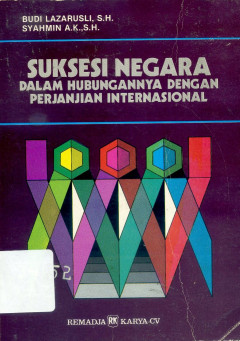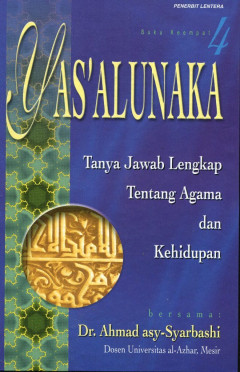Ditapis dengan

The New Encyclopaedia Britannica (Index)
The Index is the result of an accumulation of hundreds of thousands of references locating precisely the section of a page in which a person, place, thing, or idea is mentioned in any of the thousands of Encyclopaedia Britannica articles. These references have been assembled, combined, edited, and alphabetized to make an Index of more than 400,000 references. This Index gathers together all the…
- Edisi
- 15 th edition
- ISBN/ISSN
- 0-85229-571-5
- Deskripsi Fisik
- 28,5 cm
- Judul Seri
- -
- No. Panggil
- -

Encyclopaedia Britannica (Index)
This volume of Encyclopedia Britannica contains: an Index to volumes 1 to 23; an Atlas of the World; an Index to the Atlas of the World; a Glossary of Foreign Geographical Terms; and complete listings of all the contributors to Encyclopedia Britannica, first alphabetically by initials that are signed to the articles and then alhabetically by the last name.
- Edisi
- -
- ISBN/ISSN
- -
- Deskripsi Fisik
- 27,5 cm
- Judul Seri
- -
- No. Panggil
- 032

Encyclopaedia Britannica
In the life of an Encyclopedia ia measured by editions and printings, then this printing of the Encyclopedia Britannica marks the completion of 200 years of its continuous publication. If the life of an encyclopedia is measured by the passage of time, then December 1968 will mark the beginning of this encyclopedia's third century of continous exixtence as a survey of universal knowledge.
- Edisi
- -
- ISBN/ISSN
- -
- Deskripsi Fisik
- il.; 28,5 cm
- Judul Seri
- -
- No. Panggil
- 032 - R 032 BRI

The New Encyclopaedia Britannica
The 12 volumes of Micropaedia contain tens of thousands of shorter articles on specific persons, places, things, and ideas, arranged in alphabetical order. The micropaedia can be used as an information resource on its own; and it can function as support for the longer articles in the Macropaedia. The Micropaedia in turn is supported bya references in the Index and by the list of suggested readi…
- Edisi
- 15 th edition
- ISBN/ISSN
- 0-85229-571-5
- Deskripsi Fisik
- il.; 28,5 cm
- Judul Seri
- -
- No. Panggil
- R 032 BRI

The Encyclopedia Americana (1991)
The Encyclopedia Americana was the first encyclopedia published in the United States. Its first volumes appeared in 1829, and it has continued as a standard general reference work for 162 years. Many American and European intellectuals contributed to the first edition.
- Edisi
- International Edition
- ISBN/ISSN
- 0-7172-0122-8
- Deskripsi Fisik
- il.; 26 cm
- Judul Seri
- -
- No. Panggil
- R 031 ENC

The Encyclopedia Americana (1996)
- Edisi
- International Edition
- ISBN/ISSN
- 0-7172-0127-9
- Deskripsi Fisik
- il.; 26 cm
- Judul Seri
- -
- No. Panggil
- R 031 ENC
- Edisi
- International Edition
- ISBN/ISSN
- 0-7172-0127-9
- Deskripsi Fisik
- il.; 26 cm
- Judul Seri
- -
- No. Panggil
- R 031 ENC

The Americana Annual 1994
- Edisi
- -
- ISBN/ISSN
- 0-7172-0225-9
- Deskripsi Fisik
- il.; 26 cm
- Judul Seri
- -
- No. Panggil
- -
- Edisi
- -
- ISBN/ISSN
- 0-7172-0225-9
- Deskripsi Fisik
- il.; 26 cm
- Judul Seri
- -
- No. Panggil
- -

The Americana Annual 1992
- Edisi
- -
- ISBN/ISSN
- 0-7172-0223-2
- Deskripsi Fisik
- il.; 26 cm
- Judul Seri
- -
- No. Panggil
- -
- Edisi
- -
- ISBN/ISSN
- 0-7172-0223-2
- Deskripsi Fisik
- il.; 26 cm
- Judul Seri
- -
- No. Panggil
- -

Compton's Encyclopedia and Fact-Index
- Edisi
- -
- ISBN/ISSN
- 0-85229-350-X
- Deskripsi Fisik
- il.; 26 cm
- Judul Seri
- -
- No. Panggil
- R 031 COM
- Edisi
- -
- ISBN/ISSN
- 0-85229-350-X
- Deskripsi Fisik
- il.; 26 cm
- Judul Seri
- -
- No. Panggil
- R 031 COM

The World Book Dictionary
The World Book Dictionary provides information about the meaning, spelling, and pronounciation of the most important and most frequently used words and phrases in the English language. It records facts about the use of these words in both the spoken and written language. And it includes the origin, history, and development of thousands of words
- Edisi
- -
- ISBN/ISSN
- 0-7166-0288-1
- Deskripsi Fisik
- il.; 28,5 cm
- Judul Seri
- -
- No. Panggil
- -

The World Book Encyclopedia
World Book is a tool for learning - a general encyclopedia that tells about people, places, things, events, and ideas. It provides accurate information that easy to understand and easy to find.
- Edisi
- -
- ISBN/ISSN
- 0-7166-0089-7
- Deskripsi Fisik
- il.; 25,5 cm
- Judul Seri
- -
- No. Panggil
- -

Encyclopedia of Ideas That Changed the World: The Greatest Discoveries and In…
The Encyclopedia of Ideas that Changed the World tells the story of the most important of these inventions, from the firs stone choppers found among the remains of early humans in Africa to the most modern machine tools, from the homespun medicines of ancient doctors to the drugs and surgical techniques of modern times, from the wheel to the computer.
- Edisi
- First Published
- ISBN/ISSN
- 1-85028-225-0
- Deskripsi Fisik
- 223 hlm.:il.; 31 cm
- Judul Seri
- -
- No. Panggil
- R 030 ING e

Encyclopedia of World Events: Eighty turning points in history
Robert Ingpen and Philip Wilkinson explore eighty of the great events of world history. These range from decisive battles to the foundation of religions, from crucial inventions to political pronouncements. For all their diversity they have one thing in common - the have changed the history of the world. Some come from the distant past, such as the death of Julius Ceasar or the formation of the…
- Edisi
- -
- ISBN/ISSN
- 1-85028-144-0
- Deskripsi Fisik
- 256 hlm.: il.; 31 cm
- Judul Seri
- -
- No. Panggil
- R 030 ING e

Lexicon Universal Encyclopedia
The Lexicon Universal Encyclopedia, first publishe in 1980, is an entirely new reference work, the only completely new general encyclopedia in more than a decade. More than 100 employees, 2.250 scholars and other authorities, plus another 150 consultants, advisors, contributing editors, cartographers, photographers, and illustrators worked for several years to create the 9 million words, 32,000…
- Edisi
- Deluxe Home Edition
- ISBN/ISSN
- 0-7172-2030-3
- Deskripsi Fisik
- il.; 26 cm
- Judul Seri
- -
- No. Panggil
- -
 Karya Umum
Karya Umum  Filsafat
Filsafat  Agama
Agama  Ilmu-ilmu Sosial
Ilmu-ilmu Sosial  Bahasa
Bahasa  Ilmu-ilmu Murni
Ilmu-ilmu Murni  Ilmu-ilmu Terapan
Ilmu-ilmu Terapan  Kesenian, Hiburan, dan Olahraga
Kesenian, Hiburan, dan Olahraga  Kesusastraan
Kesusastraan  Geografi dan Sejarah
Geografi dan Sejarah